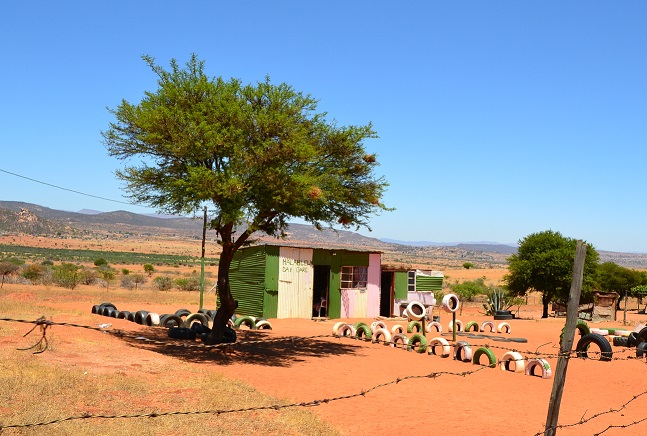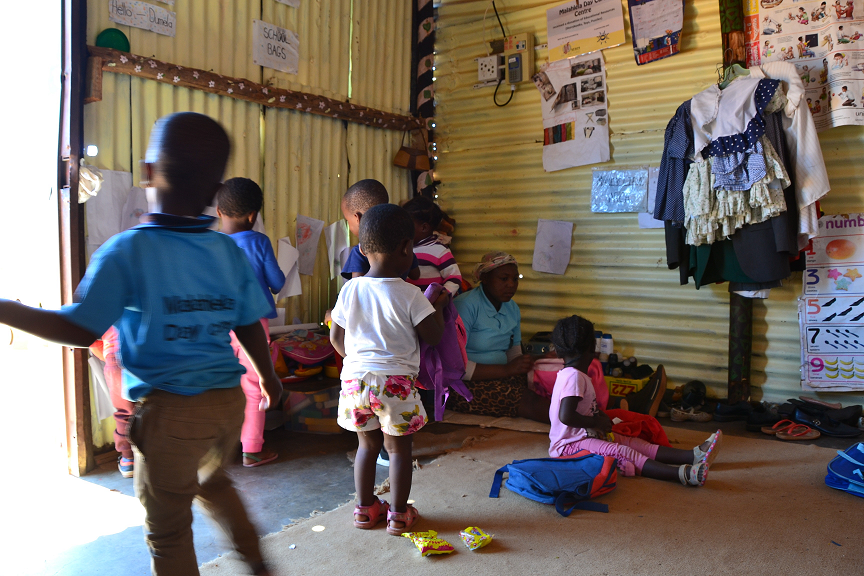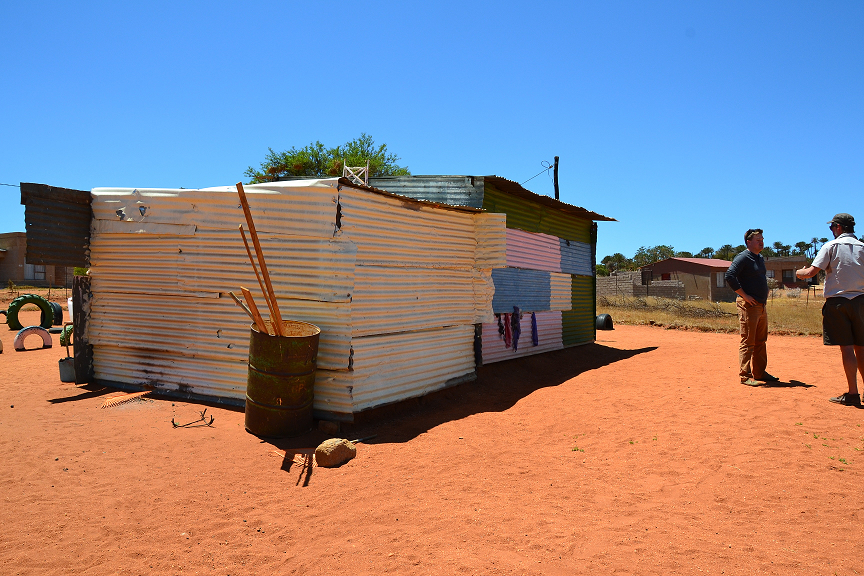Wednesday, 27 November 2019
For their tenth project, students have big ambitions and are appealing for donations and sponsorship
An architecture course in which students design and build nurseries in South Africa for pre-school children is celebrating a decade of improving access to education.
Throughout the 10 year partnership with Education Africa and the Thusanang Trust, over 320 University of Nottingham students have provided more than 2,000 pre-school children with brand-new learning facilities. The partnership, set up by the University’s Department of Architecture and Built Environment, sees that every teacher undergoes training with the Thusanang Trust to ensure no untrained teacher goes into the new building.
Over the years, the nurseries that students work with have been operating in just one small room, with no water or electricity supply and only basic toilets. Project lead, Assistant Professor Pete Russell, said: “The students are usually shocked at the facilities the children and staff are using to learn and teach in.”
The University’s tenth build will take place in April 2020 and there is strong ambition to make this project the best yet. The construction project is mostly funded by participating students, with each having to raise £2,000 to contribute towards building materials and their flights. Working to a building standard set out by the South African government, guided by the Thusanang Trust, the students will build classrooms, offices, a basic kitchen and storage as a minimum – dependant on time and conditions, play structures, fencing, and new toilets will be added.
We have achieved so much over these ten years and we have always been clear it would be a long-standing partnership. Each year our students are determined to push the design further, make the build better, and work more closely with our partners – this year we plan to build in a neighbourhood that is more remote than we have ever worked before. However, with that, the materials and project logistics are more costly and therefore we will rely on the generosity of donations from family, friends and the general public to allow these projects to continue.
To donate to the project, please visit: https://www.justgiving.com/fundraising/design-build-studio
This course offers a unique blend of hands-on experience with being able to make a real difference to people’s lives. This is only possible through fund-raising so we are appealing to our local community, businesses, friends and family to donate whatever they can to our Just Giving page to help fund our build this year.
 This is the current creche on the site that the students will start building on in April 2020.
This is the current creche on the site that the students will start building on in April 2020.
 Some of the school children who are set to benefit from the nursery transformation
Some of the school children who are set to benefit from the nursery transformation
The university students will be replacing a shack (pictured) with a permanent structure suited for the growth of the nursery; 14 children are currently taught in the facilities and there is a waiting list of 11 ready to start after construction completes in May.
Forty Architecture and Built Environment students from across the department are working in interdisciplinary teams to develop quality architectural designs for the new nursery in Mankweng, Limpopo. Once the design phase is complete, and after consulting engineers, architects, and partners in South Africa, the plans and drawings will be given to the Thusanang Trust who will work with Rosina, the nursery’s head teacher to select the preferred scheme to be built. The students will build the creche in just four weeks during Easter 2020.
To support the local economy, more than 90 per cent of materials and equipment will be bought or rented within 50km of the site, and the team will employ skilled labour from surrounding towns and villages on the build where possible. Materials include locally grown timber, steel and concrete.
The students build everything except the foundation – the team use a subcontractor to put on the roof sheeting but the roof structure is built by the students.

Our course is the only RIBA validated architecture course in the UK to offer students a chance to design and build a complete building with a focus on service-learning every year for the last ten years. Students must carefully consider budget - with absolutely no option to run over - the four-week construction time and the technology available in rural South Africa. It’s a unique experience for undergraduates - our students leave with, not only a full construction project under their belts and an impressive portfolio, but also with a greater understanding of social responsibility.
Education Africa welcomes the opportunity to partner again with the University of Nottingham through our Social Architecture project, and we look forward to working together to make a meaningful difference to the lives of yet another disadvantaged community in rural Limpopo. It is a sad reality that many rural South African communities simply do not have access to quality educational facilities.
Early Childhood Development, while a crucial foundation to a child’s learning and development, is often neglected because these communities live in poverty and simply do not have the funds to make it a priority for their young children. So it often takes an initiative such as this to ensure that these young children get a good start in life and do not become part of yet another lost generation which is stuck in a cycle of poverty. The University of Nottingham is to be commended for their commitment to this project - together we can and will make real change happen.
Multi-disciplinary design practice, rg+p, will partner this year’s project, supporting the students with technical and design advice, with two staff members helping with construction on site in April.
rg+p’s architectural director, James Badley commented:
“This is a unique opportunity for students to learn what it takes to deliver a scheme, from conception through to construction. So far we’ve seen some really imaginative ideas, which have embraced the brief and properly considered the tight time and budget constraints. We’re extremely proud to support this project and help deliver a new facility that will make such a difference to the community in Limpopo.”
In previous years, the project has tripled the size of the original nursery space, which as a result of the larger space and improved facilities, enabled schools to get formal registration and therefore government funding.
At the time of building in 2018/19, more than 80 preschool children attended the nursery and in the space of 6 months following the new building, this figure has risen to 112 pupils. The project helps to readdress the inequality faced by pre-school children from rural African villages who often don’t have access to education prior to primary school.
What it's like to build a creche in four weeks in South Africa
Kiran Shah, a sixth year student on the course, tells us what it was like to be part of the build in South Africa in 2015.
The project provided a vast array of opportunity, whether it was learning about construction, the subsequent workshops that followed in university to prepare us for the build or engaging through fundraising activities. The former helped develop problem solving and physical skills, whilst the latter helped develop initiative, entrepreneurial and leadership skills.
As a project within a school of architecture, being able to take part in a community building in a completely different scenario to what I was used to, was eye-opening and helped me learn about the different users and needs, along with how to design for this. Going on site to build the creche taught me about the technical aspect of design whilst being able to see how communities work in very rural areas. One of the fondest memories involves the children on site in the existing creche, and how the site was a social gathering spot - including children who weren't part of the school, their curiosity and willingness to explore and interact with us. This excitement gave an insight into the impact we were having to a community whom we had not ever met prior to the trip. This showed us that any donation, irrespective of quantity, is invaluable and resonates with the project, and subsequently the community.
Additionally, partaking in this project and having the opportunity to build something that was designed during architectural studio gave an extra dimension when I was interviewing with companies for summer internships and placements, as many students are thought to lack knowledge on how things are built when graduating from an undergraduate architectural course. The project has helped foster a passion for construction, how things are built and we, as designers and architects, can push this further whilst ensuring the design can be built and function as we intended it to.
Story credits
More information is available from Pete Russell, Assistant Professor in the Faculty of Engineering
at the University of Nottingham, on 0115 8467542 or Peter.Russell2@nottingham.ac.uk or
Katie Andrews, Media Relations Manager at the University of Nottingham, on
0115 84 67156 or katie.andrews@nottingham.ac.uk
University of Nottingham academics can be interviewed for broadcast via our Media Hub, which offers a Globelynx fixed camera and ISDN line facilities at University Park campus. For further information please contact a member of the Communications team on +44 (0)115 951 5798, email pressoffice@nottingham.ac.uk or see the Globelynx website for how to register for this service.
For up to the minute media alerts, follow us on Twitter
Notes to editors:
The University of Nottingham is a research-intensive university with a proud heritage, consistently ranked among the world's top 100. Studying at the University of Nottingham is a life-changing experience and we pride ourselves on unlocking the potential of our 44,000 students - Nottingham was named both Sports and International University of the Year in the 2019 Times and Sunday Times Good University Guide, was awarded gold in the TEF 2017 and features in the top 20 of all three major UK rankings. We have a pioneering spirit, expressed in the vision of our founder Sir Jesse Boot, which has seen us lead the way in establishing campuses in China and Malaysia - part of a globally connected network of education, research and industrial engagement. We are ranked eighth for research power in the UK according to REF 2014. We have six beacons of research excellence helping to transform lives and change the world; we are also a major employer and industry partner - locally and globally.
More information about the course and previous builds in South Africa, including photographs can be found here.
Media are invited to cover the tenth build in South Africa next year – please contact the press office for more information.
Education Africa
Education Africa is a non-profit organisation with a proud track record of successful delivery on its thriving projects.
Established in 1992, Education Africa strives to reach and uplift the poorest of the poor. We aim to assist disadvantaged South Africans in their quest to obtain a quality, relevant education in order to ensure that they are in a position to become global citizens and a competitive, productive element in the local job market.
Education Africa’s head office is based in Johannesburg, South Africa. The team is headed by James Urdang, who is both the Chief Executive Officer and founder of Education Africa
Thusanang Trust
Thušanang, meaning 'to help one another' is a non-profit organisation founded in 1986. Their core focus is the development and well-being of young children. The majority of their activities are conducted through community-based Early Childhood Development (ECD) centres where they reach the communities through the ECD practitioners, committees and parents.
Residential training is offered at their Centre in Haenertsburg and workshops take place at venues in the rural areas that are more accessible to their beneficiaries.
rg+p is a long established, award-winning multi-disciplinary practice with studios in London, Leicester and Birmingham. Together with architectural design, rg+p also specialises in place making & urban design, project management & cost consultancy, planning consultancy, health & safety consultancy and land and property. The company works throughout the UK and is dedicated to providing quality and sustainability within the built environment. For more information, please visit www.rg-p.co.uk
Notes to editors:
About the University of Nottingham
Ranked 97 in the world and 17th in the UK by the QS World University Rankings, the University of Nottingham is a founding member of Russell Group of research-intensive universities. Studying at the University of Nottingham is a life-changing experience, and we pride ourselves on unlocking the potential of our students. We have a pioneering spirit, expressed in the vision of our founder Sir Jesse Boot, which has seen us lead the way in establishing campuses in China and Malaysia - part of a globally connected network of education, research and industrial engagement.
Nottingham was crowned Sports University of the Year by The Times and Sunday Times Good University Guide 2024 – the third time it has been given the honour since 2018 – and by the Daily Mail University Guide 2024.
The university is among the best universities in the UK for the strength of our research, positioned seventh for research power in the UK according to REF 2021. The birthplace of discoveries such as MRI and ibuprofen, our innovations transform lives and tackle global problems such as sustainable food supplies, ending modern slavery, developing greener transport, and reducing reliance on fossil fuels.
The university is a major employer and industry partner - locally and globally - and our graduates are the third most targeted by the UK's top employers, according to The Graduate Market in 2024 report by High Fliers Research.
We lead the Universities for Nottingham initiative, in partnership with Nottingham Trent University, a pioneering collaboration between the city’s two world-class institutions to improve levels of prosperity, opportunity, sustainability, health and wellbeing for residents in the city and region we are proud to call home.
More news…